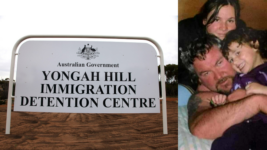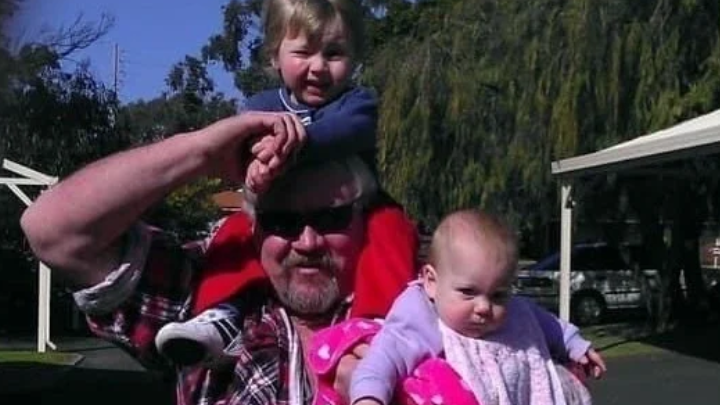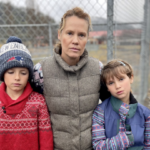Another Australian Father Slated for Deportation, as Labor Continues Morrison’s Harsh Regime

Australia has always had a nasty policy of deporting people from the continent. And this has been ever-increasingly so since former prime minister Scott Morrison oversaw the passing a suite of immigration character test and deportation amendments when immigration minister in late 2014.
Stephen Pokrywka, a 55-year-old long-term resident of Western Australia, knows this too well.
Having been in the country since the age of 12, the UK-born man is right now detained in Yongah Hill Immigration Detention Centre slated to be sent to England, despite his entire family being here.
Pokrywka has fathered six local children, three of whom are First Nations descendant. And these days, Stephen is a grandfather, and his British mother and UK-born sisters have all become Australian citizens over the last four decades.
Yet, the government is attempting to turf Pokrywka out of the jurisdiction it presides over, as he was paroled in January, after having served five years on being convicted of attempting to supply a prohibited drug, which was a criminal offence he committed after developing his own habit.
And what’s certainly is another crime is that Australia considers it reasonable to deport people, like Stephen, who’ve long been immersed in local culture, over crimes they’ve served time for, thus the state shirks any responsibility and instead lays the blame for this criminality on a foreign nation.

Double punishment
“Stephen Pokrywka is Australian but for a piece of paper – citizenship,” veteran WA social justice campaigner Gerry Georgatos told Sydney Criminal Lawyers. “He’s been on a permanent resident visa all his life: since coming to Australia from England as a child.”
“Stephen was paroled in January but instead of returning to his family, to employment, he was denied the right,” Gerry continued. “On his parole release date, the department was waiting for him and transported him from Bunbury Regional Prison to Yongah Hill Immigration Detention Centre.”
Georgatos and the Pokrywka family aren’t denying Stephen’s crime was serious. But they are arguing that, as he’s served his time like everyone else who commits a similar offence, he should then be returned to the community, not banished to a foreign country over his only carceral sentence.
Since Morrison tweaked these laws in 2014, which didn’t directly affect Pokrywka’s case, this policy has seen us dump thousands of NZ-born local residents back across the ditch, and besides them, the law captures any noncitizen falling short of certain stipulations, or at times, not even that.
Back when the Albanese government was putting up a show of being less divisive than the other lot, immigration minister Andrew Giles in early 2023 issued Direction 99, which calls on decisionmakers to consider “the strength, nature and duration of ties”, as well as the “best interests” of local kids.
“The migrant story of Australia needs to own its good and bad and not make dumping grounds of other nations, using people who have lived as if Australians to do this, and whose only experience is Australia,” Georgatos made certain.
Shirking responsibilities in law
One of the first pieces of legislation passed by Australian parliament after federation, was the Pacific Islanders Labourers Act 1901 (Cth), which aimed to deport all South Sea Islander people, who’d been brought here, often by coercion, to work as indentured labourers over the four decades prior.
These days, it’s the Morrison-amended section 501 of the Migration Act 1958 (Cth) that’s led to 8,000 noncitizens being deported over the last decade, as a prior stipulation that noncitizens sentenced to an accumulated 24 months was then dropped to deportation on 12 months or more.
The new stipulation applied to multiple sentences and was backdated, ensuring that people were captured for numerous minor offences. And as for the 12 months, this didn’t necessarily mean time served, as it applies to an overall sentence regardless of if it was suspended or served in rehab.
Home Affairs figures show that in December 2023, out of an overall 872 onshore immigration detainees, 531, or 61 percent of them, were section 501 detainees: residents being turfed.
And the other Morrison special that deporters of noncitizens have applied since the 501 channel turned into a trickle has been section 116 of the Act, which permits expulsions of noncitizens that merely pose a risk to “health, safety or good order”, regardless of any prior sentence or conviction.
But section 501 had already been internationally condemned, prior to Morrison’s mass deportation measures.
In 2011, the UN Human Rights Council ruled section 501 to be a violation of international law in relation to the 2006 deportation of Stefan Nystrom, who’d arrived in the country three weeks after being born and was deported to Sweden at the age of 33 and then suffered a breakdown.
Prior to the 1998 insertion of the section 501 character test law into the Migration Act, deportation was possible at ministerial discretion if a noncitizen had been convicted of a crime punishable by at least 12 months prison and they hadn’t been a resident for longer than 10 years.
But since the Howard government inserted 501 in the late 1990s, long-term residents of 10 years or more have been deported under the character test. And since then, deportation limits have been either one conviction carrying 12 months or more or multiple sentences surpassing 12 months.
“I have long contended that the 501 migration laws that allow for wide remit compassionless deportations, the decimation of families, which abrogate the purpose of carceral penance and the subsequent right to redemption, must be reformed,” Georgatos explained.
“What sort of society shreds families?” he questioned. “What sort of society denies redemption and salvation, the clean slate? Where is the redeemer in us as a society?”
A plea to reason, a plea for humanity
The argument for raising the age of criminal responsibility from 10 to 14 is that child cognitive ability has not developed to the point of being capable of grasping such responsibility, yet the government claims that somehow the UK is responsible for Pokrywka’s lawbreaking, when he arrived here at 12.
“Since 2014, eight thousand noncitizens have had their visas cancelled and have been deported,” Georgatos continued. “On a proportional basis, Australia has degenerated to the nation with the highest rate of deportations of individuals with more than a decade’s residency.”
Last year, Georgatos raised the case of 50-year-old UK-born man Robert Taylor, who was slated for deportation despite being a lifelong resident and father-of-six Australian children and nine grandchildren, and he had too been diagnosed with cancer whilst locked up in Yongah Hill.
Due to the social justice advocate’s efforts, Taylor was freed and allowed to spend the last seven months of his life with his Australian family before passing last month. And this was just one out of a total of 21 resident noncitizens, he’s seen released, despite the department greenlighting expulsion.
“But this is not the story of the majority of those slated for deportation,” Georgatos continued. “The majority are unrepresented. There’s no seasoned expertise to guide them through the arduousness of appeals and tribunals.”
“Stephen is remorseful,” added the man representing the detainees. “The parole board approved him for release. Home Affairs must start respecting the judicial systems and court ordered sentences. They should not be acting as some power above the courts and further punish.”
Stephen’s 21-year-old daughter Jess Pokrywka has launched an online petition calling on the Australian government to grant him and his family clemency, as he has served his time within the society of which he has grown and offended within, so he doesn’t deserve to now be banished.
“My Dad is suffering. His loved ones are suffering. My Dad deserves a second chance. He is off the drugs. He is regretful. He is ready to rebuild his life,” Jess told SCL. “I refuse to let my dad become another deportation. He is a good man. A hard worker and a family man.”
“My Dad is a part of a massive problem: deportations out of control. He is one of far too many,” the young woman said in conclusion. “He was granted the huge step of parole. He was trusted by the board to do good and instead Immigration has disregarded his right to a second chance.”







